Overview

A solid majority of Americans (61%) continue to approve of Barack Obama’s job performance, although they express mixed views of several of his policies. An important positive sign for Obama is the public’s continued optimism that his policies will improve the economy – fully 65% express this view. A smaller majority (55%) is optimistic Obama will reduce the budget deficit over the long-term. Nonetheless, Obama’s job approval on the economy has declined from 60% in April to 52% currently.
The slippage in the president’s economic ratings appears unrelated to the public’s assessments of his administration’s impact on current economic conditions – most (53%) say his policies have “not had an effect so far” or that it is too early to tell. Instead, it may have more to do with his relatively poor ratings for handling the problems of troubled automakers General Motors and Chrysler.
Nearly as many disapprove (44%) as approve (47%) of Obama’s performance in handling the automakers’ problems. There is even less s
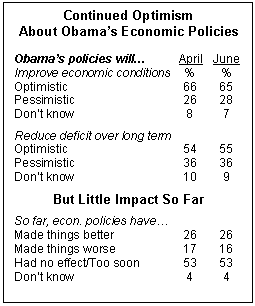
upport for government efforts to keep G.M. and Chrysler in business: 58% disapprove of the government spending billions to keep the troubled automakers in business, while just 36% approve.
On other economic policies, 55% approve of the $800 billion economic stimulus passed in February and an even larger majority (73%) approves of substantially increasing spending on roads, bridges and other public works projects. But only about half (49%) approves of spending billions to keep financial markets secure and Obama draws mixed ratings for his handling of this issue (50% approve, 40% disapprove). Overall opinions about Obama’s economic policies have changed little since March.
The latest national survey by the Pew Research Center for the People & the Press, conducted among 1,502 adults June 10-14, shortly after Obama’s major overseas trip, finds the public rendering l
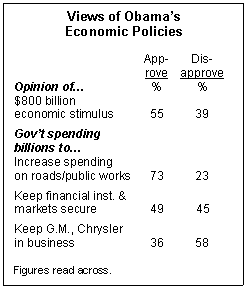
argely positive judgments about his approach to foreign policy. Currently, 57% approve of Obama’s handling of foreign policy, which is largely unchanged from April (61%).
About half of Americans (51%) believe that Obama is about right in his approach to foreign policy and national security issues, while 38% say he is not tough enough. This represents a modest decline from last September, during the presidential campaign, when 45% of registered voters said he would not be tough enough on foreign policy.
Moreover, only about one-in-five Americans (21%) say that the United States is less safe from terrorism under the Obama administration than it was under the Bush administration. More than four-in-ten (44%) say Obama’s policies have not made a difference, while 28% believe they have made the nation safer from
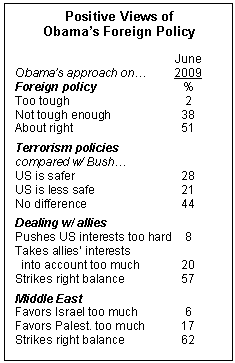
terrorism.
And in the aftermath of his trip, Obama’s approaches to U.S. allies and the Middle East are viewed positively. Nearly three times as many say Obama is striking the right balance in dealing with U.S. allies than say he is taking the allies’ interests into account too much (57% vs. 20%). And while 62% say he strikes the right balance in dealing with the Middle East, just 17% say he favors the Palestinians too much.
However, while Obama receives solid approval ratings on North Korea (51% approve) – which a larger share of Americans see as a major threat to the United States – there is increasing disapproval of his decision to close the U.S. military prison in Guantanamo Bay, Cuba. In mid-April, the public approved of his decision by 51% to 38%: now, opinion is evenly divided (45% approve, 46% disapprove).
The survey finds that as Congress opens a major debate over reforming the nation’s health care system, public opinion about the issue has changed somewhat since President Clinton launched his unsuccessful effort to pass an overhaul of health care in 1993.
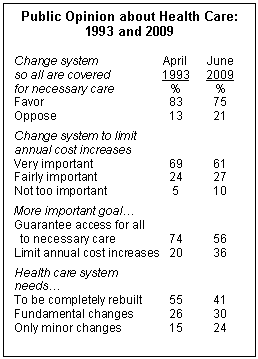
There continues to be widespread support for changing the health care system so that all Americans have insurance that covers all medically necessary care: 75% favor this currently, while 21% are opposed. However, the percentage favoring this proposal is down from 83% in April 1993. Similarly, while a large majority (61%) believes it is very important to limit annual increases in health care costs, fewer say that now than did so 16 years ago (69%).
When asked which is more important – to control annual cost increases or guarantee all Americans access to needed care – a majority (56%) says that it is more important to provide access to necessary medical care for all Americans while 36% say it is more important to control health care costs. In 1993, the public also opted for guaranteed access to care for all, but by a greater margin (74% to 20%).
Perhaps the most important change since 1993 is in the public’s assessment of how much change the current health care system needs. In April 1993, a majority (55%) said the system needed to be completely rebuilt, 26% said it needed fundamental changes, while 15% said it needed only minor changes. Today, fewer than half (41%) say the system needs to be completely rebuilt, while 30% say it requires fundamental change and 24% say the system works pretty well and needs only minor changes.
Sotmayor’s Confirmation Favored
Half of Americans (50%) favor the confirmation of Judge Sotomayor to the Supreme Court while a quarter oppose her confirmation and another quarter offer no opinion. Sotomayor’s current support is comparable to s
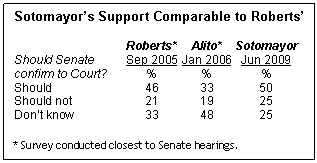
upport for Chief Justice John Roberts just prior to his confirmation hearings in 2005.
Shortly before Samuel Alito’s hearings in 2006, a third (33%) said the Senate should confirm Alito while 19% were opposed; but nearly twice as many expressed no opinion than do so about Sotomayor’s confirmation (48% vs. 25%).
When asked about Sotomayor’s ideology, about as many people say she is moderate (34%) as say she is liberal (31%). There is a similar division of opinion about whether Obama is listening more to liberals in his party
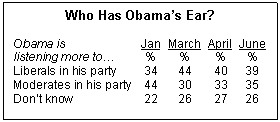
than to moderates: 39% believe that Obama listens more to liberal members of his party while 35% say that he listens more to moderate Democrats.
There has been little change in these opinions since April, when 40% said Obama listened more to liberals in his party and 33% said he listened more to moderates in the Democratic Party. However, somewhat more liberal Democrats now believe that Obama is listening more to them than did so in April; 41% of liberal Democrats say Obama listens more to liberals in his party, up from 28% in April.
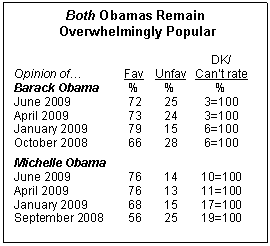
The survey finds that Obama continues to draw higher personal ratings than job approval ratings. And if anything, Michelle Obama is even more popular than her husband. More than seven-in-ten Americans (72%) say they have a favorable impression of Barack Obama, while 25% have an unfavorable opinion, virtually unchanged from April.
Michelle Obama’s personal image also changed little: 76% have a favorable view of the first lady, while 14% have an unfavorable impression. As was the case in April, a majority of Republicans (59%) say they have a favorable opinion of Michelle Obama as do even larger shares of independents (73%) and Democrats (92%).




